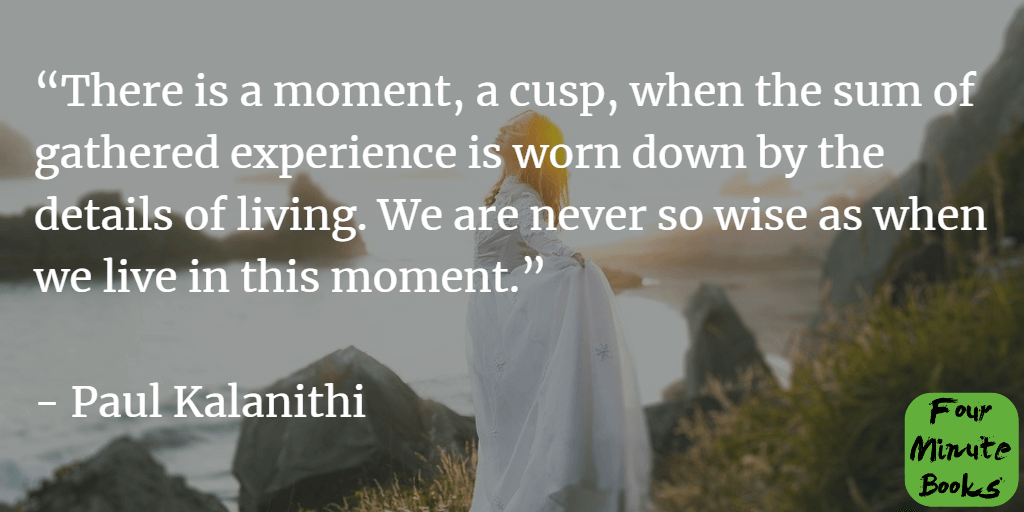I discovered this book for the first time with only a few lines of background information: it is the autobiography of a doctor named Paul Kalanithi, who was diagnosed with lung cancer at the age of 36 (despite never smoking) and died two years later. It had been a while since the English version was the only one accessible, and until there was a Vietnamese translation, which had also been published for a long time, before I chose to read this book. Maybe it's just a coincidence that I'm confronting difficulties and concerns in my life, as well as concerns and questions regarding the purpose of life. This novel arose as a natural result of a desire to discover answers or just to experience a tragedy that I had not felt in a long time via reading.
"When Breath Becomes Air" begins with anguish, the pain of a buddy who didn't spend much time with Paul before he died, and the relief of knowing that Paul is still with us, via the words he penned to create this book, his legacy. That agony endured until the detailed account, as if never to be forgotten, of the moment when Paul began to exhibit indications of cancer, doubts, then reassurance. The ultimate diagnosis is the consequence of a diagnostic that would permanently alter the doctor's hopes and plans with his wife Lucy. Then things calmed down as he reconstructed his path to becoming a doctor for readers to experience, from when he was a child to college, career orientation for your own benefit.
Throughout that period, or more accurately, the limited time Paul has been alive, he has battled to find an answer to the question of the relationship between the brain and what defines a person. People, their connections, emotions, and sentiments... Finally, a literature-loving student with a Master's degree in English Literature and a Bachelor of Body Biology chose the Department of Surgery. Neurosurgery as its guide, with the brain as its core - the most magical, dominating, and fascinating element of the human body. Paul brilliantly recreates his time as a Resident Doctor via the words of a doctor and writer - a period of severe testing and terrible strain that every student Every medical doctor needs to go through in order to officially become a Doctor.
Being a Resident Doctor provides Paul with experiences that go beyond the confines of lectures and medical literature, where he discovers the significance of the career he has chosen, the answer he is always seeking regarding the purpose of life, and the duty of the doctor. and the doctor's obligation to the patient was gradually becoming clear to him. It's a place where the beginning and end of a person's existence are frequently inside the confines of a hospital, and Paul learns that, in many circumstances, physicians shouldn't be attempting to preserve what's already safe post. In a career that sees a lot of death as well as life, a doctor must sometimes be a messenger of death, offering as much support as possible for patients and their families to accept death. At the same time, the doctor must be the one to help the patient recognize what the actual meaning of life is, as well as to help the patient maintain his "identity" during tough times of sickness.
Paul's tenure as a Resident Doctor immediately reminded me of the FOX TV show "The Resident" (just watched the first episode on Fox Life last night). The video depicts the people' daily lives and jobs, as well as their hardships, troubles, and concerns. The lives of resident physician Paul Kalanithi and his colleagues are also packed with the unforeseeable perils of the medical profession, as well as decisions that must be taken in a matter of seconds - moments that can be life-threatening. assess if the patient will live or die I recall a character in the film claiming that if the medical profession was simple, everyone would have gone to medical school since it is the finest career. Yes, saving someone's life is the most fulfilling feeling in the world. However, the medical profession is also one of the most challenging, needing not only knowledge and abilities but also stamina to row with the patient between life and death.
I love Paul's perspective on his career, viewing his work as more than just labor and patients as more than simply a problem to be handled. In Paul's opinion, the medical profession is a holy mission, a "genuine calling," a noble goal to which he would devote his whole life. If you enter the medical industry just to gain money, things will be extremely straightforward; simply graduate, work for a few years, and then create a private clinic, seeing roughly 15-20 patients each day for free. without stress, pressure, or having to confront challenging questions about life and death, religion, hope, or the ultimate purpose of medical practice. Of course, for the sake of living, most people will choose a job that helps them make a lot of money quickly and easily, about 5 million/month is high.
The second chapter of the book takes the reader back to a period when Paul was having cancer treatment and trying to devote as much of his life to his noble cause as possible by returning to performing neurosurgery. Along with it, his sentiments about time, life, religious beliefs, and philosophical views are awakened inside the doctor, who is now experiencing what the patient is experiencing. Your man has gone through a lot. At the same time, Paul assumed the roles of patient and doctor; he had just listened to his oncologist Emma Hayward's treatment recommendations while simultaneously making his own. Death is still present as a ghost, but it is also life, life generated through in vitro fertilization technology, which gave Paul and Lucy baby Cady - their daughter - in the midst of a period when Paul's life looked to be coming to an end.
Everyone must die; you don't have to be a doctor to understand this. But Paul had no idea his death would come at such an unexpected moment. I grieved when I saw a father holding his young girl, trying to gather the few moments before he died and convert them into the most joyous, beautiful time filled with love for him. He would not be present to witness the child's mature years. I sobbed as I read the Epilogue written by Paul's wife, Lucy Kalanithi, which eloquently and emotionally portrays the final days of Paul's life, when he no longer had the power to battle the sickness. Allow the physicians to withdraw the ventilator when he was ready to die, and spend the remaining time with his family by his side, confronting the inevitable end. And, as Paul's wife put it, he may have discovered the meaning of life in these final days, the meaning of not being scared of death, of looking at it, embracing it, and living as completely as possible the time you have on earth.
Some people prefer to live with the goal of making a lot of money in order to truly enjoy life. There's nothing wrong with it; as the phrase goes, you only have one life. But, in my opinion, life should not end with getting money and enjoying it. Your remaining life should be an opportunity for you to leave your own imprint for posterity; it will be a legacy for which you will be remembered. And, in my opinion, Paul Kalanithi has succeeded; this book, along with Cady, will live on to remind people of him. Those are the creatures in whom his spirit and attributes will always reside. Writing and writing skill are so significant because, unless burnt, writing and books will always be proof of a person's intelligence, feelings, and opinions. Cady Kalanithi will envision her father via this novel, whose sad fate did not give him much more time with her. And, via this book, Lucy Kalanithi will always carry a piece of her late husband, whom she has always loved and will never stop loving, even if he is no longer with her.
Some people choose to live with the goal of making a lot of money in order to truly enjoy life. There's nothing wrong with that; as the saying goes, you only get one life. But, in my opinion, life should not end with making money and enjoying it. Your remaining life should be an opportunity for you to leave your own imprint for posterity; it will be a legacy for which you will be remembered. And, in my opinion, Paul Kalanithi has succeeded; this book, along with Cady, will live on to remind people of him. Those are the beings in whom his soul and qualities will always reside. Writing and writing craft are so influential because, unless burned, writing and books will always be proof of a person's intellect, feelings, and thoughts. Cady Kalanithi will imagine her father through this book, whose harsh fate did not allow him much more time with her. And, through this book, Lucy Kalanithi will always carry a piece of her late husband, whom she has always loved and will never stop loving, even though he is no longer with her.




